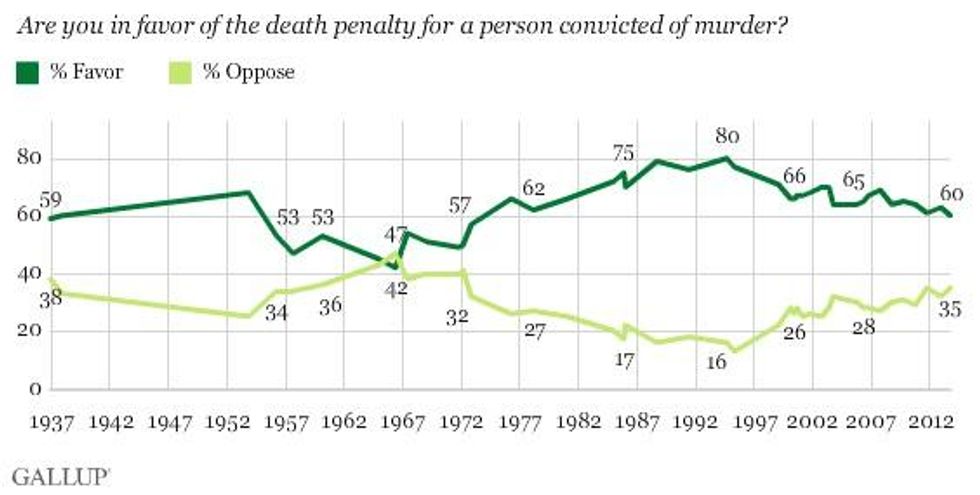US Support for Death Penalty Falls to Forty-Year Low
Most Americans still support state sanctioned murder, but progress shows through as troubling numbers continue to fall

Though a majority of Americans continue to support a practice that is condemned by human rights advocates and banned in most other highly-developed nations, the 60% approval rating for state murder is the second lowest in nearly eighty years and shows the recent trend against capital punishment continues.
As Gallup reports, the new results show the lowest level of support measured "since November 1972, when 57% were in favor." Gallup explains that though a majority of Americans have always supported it, approval of the death penalty peaked at 80% in 1994, but has gradually declined ever since.
As this graph shows:

According to Agence France-Presse: "Of the 50 US states, 32 implement the death penalty, while 18 plus the federal capital city of Washington have abolished it."
From Gallup:
Americans have typically favored the death penalty; in fact, support has exceeded opposition in all but one survey, conducted in May 1966, during an era marked by philosophical and legal challenges to the death penalty from the mid-1950s through the early 1970s. Americans' support for the death penalty waned during that time. The culmination of that era was the Supreme Court's 1972 Furman v. Georgia decision, which invalidated all state death penalty statutes on technical grounds but stopped short of declaring the practice itself unconstitutional. Four years later, the court ruled that several newly written death penalty laws were constitutional, and executions resumed in the U.S. shortly thereafter.
From then until the mid-'90s, death penalty support climbed, reaching 80% in 1994, a year in which Americans consistently named crime as the most important problem facing the United States.
The current era of lower support may be tied to death penalty moratoriums in several states beginning around 2000 after several death-row inmates were later proven innocent of the crimes of which they were convicted. More recently, since 2006, six states have repealed death penalty laws outright, including Maryland this year.
And as Common Dreams reported on Tuesday, controversies in several states regarding the cocktail of drugs administered to kill convicted criminals have spurred deep concern over the wanton cruelty and inhumanity of the practice.
_____________________________________
An Urgent Message From Our Co-Founder
Dear Common Dreams reader, The U.S. is on a fast track to authoritarianism like nothing I've ever seen. Meanwhile, corporate news outlets are utterly capitulating to Trump, twisting their coverage to avoid drawing his ire while lining up to stuff cash in his pockets. That's why I believe that Common Dreams is doing the best and most consequential reporting that we've ever done. Our small but mighty team is a progressive reporting powerhouse, covering the news every day that the corporate media never will. Our mission has always been simple: To inform. To inspire. And to ignite change for the common good. Now here's the key piece that I want all our readers to understand: None of this would be possible without your financial support. That's not just some fundraising cliche. It's the absolute and literal truth. We don't accept corporate advertising and never will. We don't have a paywall because we don't think people should be blocked from critical news based on their ability to pay. Everything we do is funded by the donations of readers like you. Will you donate now to help power the nonprofit, independent reporting of Common Dreams? Thank you for being a vital member of our community. Together, we can keep independent journalism alive when it’s needed most. - Craig Brown, Co-founder |

Though a majority of Americans continue to support a practice that is condemned by human rights advocates and banned in most other highly-developed nations, the 60% approval rating for state murder is the second lowest in nearly eighty years and shows the recent trend against capital punishment continues.
As Gallup reports, the new results show the lowest level of support measured "since November 1972, when 57% were in favor." Gallup explains that though a majority of Americans have always supported it, approval of the death penalty peaked at 80% in 1994, but has gradually declined ever since.
As this graph shows:

According to Agence France-Presse: "Of the 50 US states, 32 implement the death penalty, while 18 plus the federal capital city of Washington have abolished it."
From Gallup:
Americans have typically favored the death penalty; in fact, support has exceeded opposition in all but one survey, conducted in May 1966, during an era marked by philosophical and legal challenges to the death penalty from the mid-1950s through the early 1970s. Americans' support for the death penalty waned during that time. The culmination of that era was the Supreme Court's 1972 Furman v. Georgia decision, which invalidated all state death penalty statutes on technical grounds but stopped short of declaring the practice itself unconstitutional. Four years later, the court ruled that several newly written death penalty laws were constitutional, and executions resumed in the U.S. shortly thereafter.
From then until the mid-'90s, death penalty support climbed, reaching 80% in 1994, a year in which Americans consistently named crime as the most important problem facing the United States.
The current era of lower support may be tied to death penalty moratoriums in several states beginning around 2000 after several death-row inmates were later proven innocent of the crimes of which they were convicted. More recently, since 2006, six states have repealed death penalty laws outright, including Maryland this year.
And as Common Dreams reported on Tuesday, controversies in several states regarding the cocktail of drugs administered to kill convicted criminals have spurred deep concern over the wanton cruelty and inhumanity of the practice.
_____________________________________

Though a majority of Americans continue to support a practice that is condemned by human rights advocates and banned in most other highly-developed nations, the 60% approval rating for state murder is the second lowest in nearly eighty years and shows the recent trend against capital punishment continues.
As Gallup reports, the new results show the lowest level of support measured "since November 1972, when 57% were in favor." Gallup explains that though a majority of Americans have always supported it, approval of the death penalty peaked at 80% in 1994, but has gradually declined ever since.
As this graph shows:

According to Agence France-Presse: "Of the 50 US states, 32 implement the death penalty, while 18 plus the federal capital city of Washington have abolished it."
From Gallup:
Americans have typically favored the death penalty; in fact, support has exceeded opposition in all but one survey, conducted in May 1966, during an era marked by philosophical and legal challenges to the death penalty from the mid-1950s through the early 1970s. Americans' support for the death penalty waned during that time. The culmination of that era was the Supreme Court's 1972 Furman v. Georgia decision, which invalidated all state death penalty statutes on technical grounds but stopped short of declaring the practice itself unconstitutional. Four years later, the court ruled that several newly written death penalty laws were constitutional, and executions resumed in the U.S. shortly thereafter.
From then until the mid-'90s, death penalty support climbed, reaching 80% in 1994, a year in which Americans consistently named crime as the most important problem facing the United States.
The current era of lower support may be tied to death penalty moratoriums in several states beginning around 2000 after several death-row inmates were later proven innocent of the crimes of which they were convicted. More recently, since 2006, six states have repealed death penalty laws outright, including Maryland this year.
And as Common Dreams reported on Tuesday, controversies in several states regarding the cocktail of drugs administered to kill convicted criminals have spurred deep concern over the wanton cruelty and inhumanity of the practice.
_____________________________________

